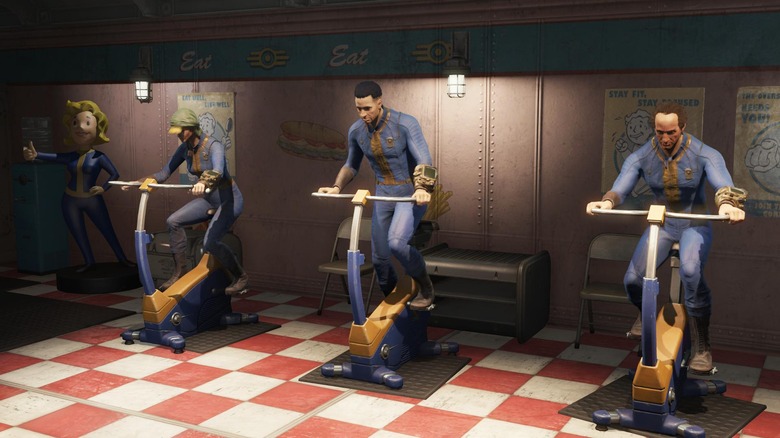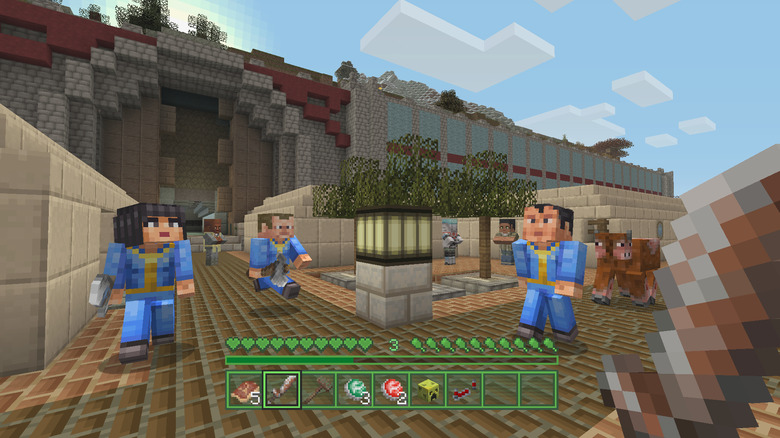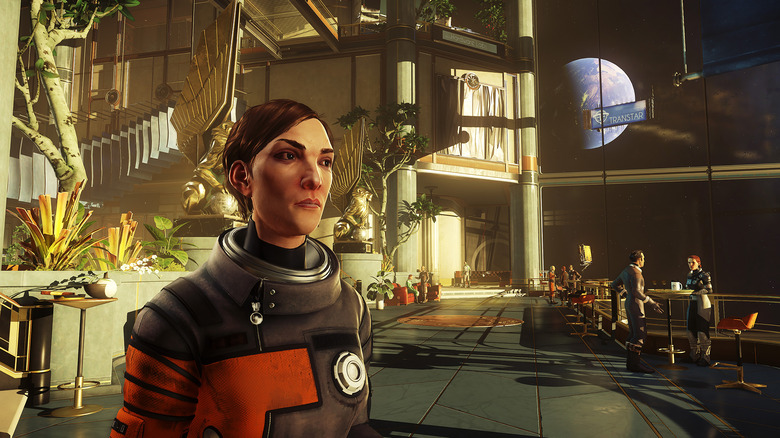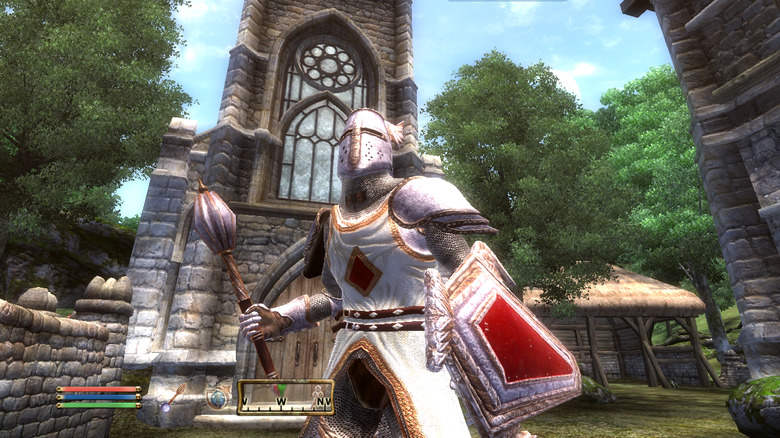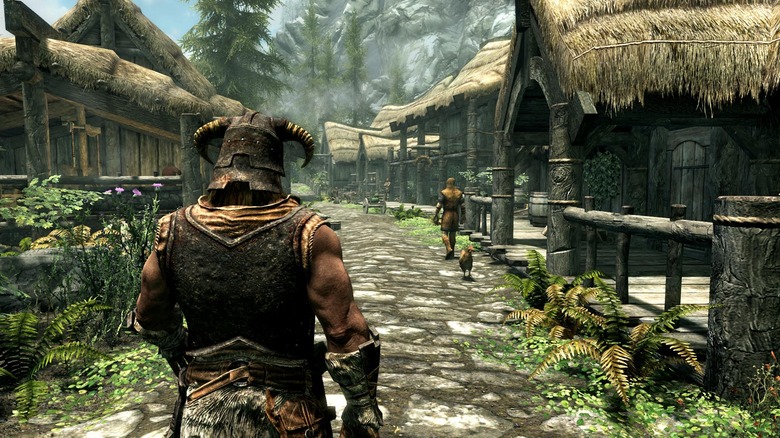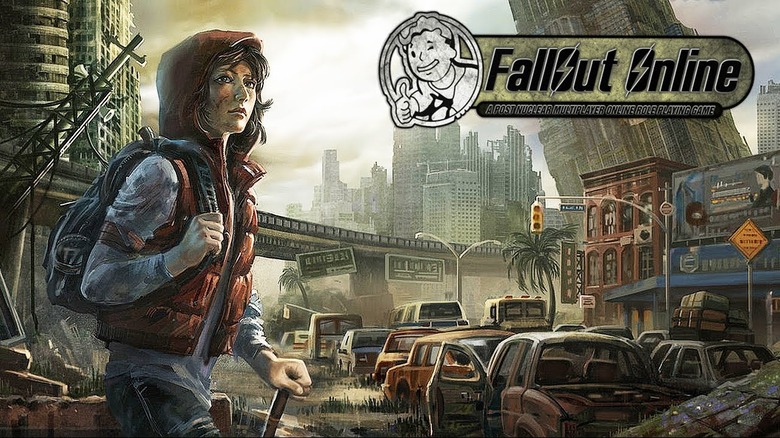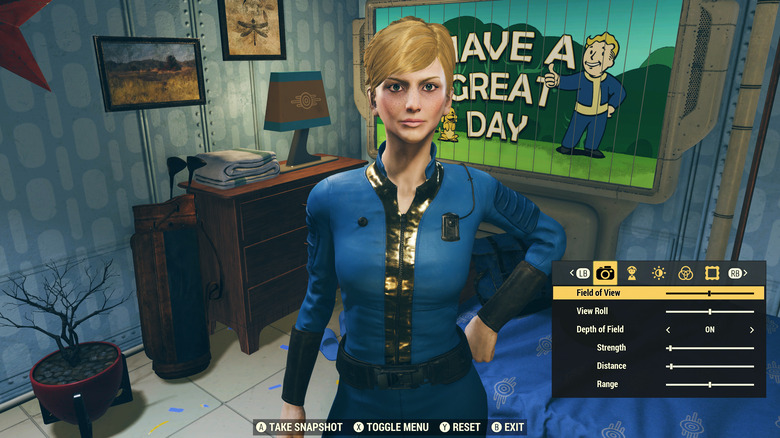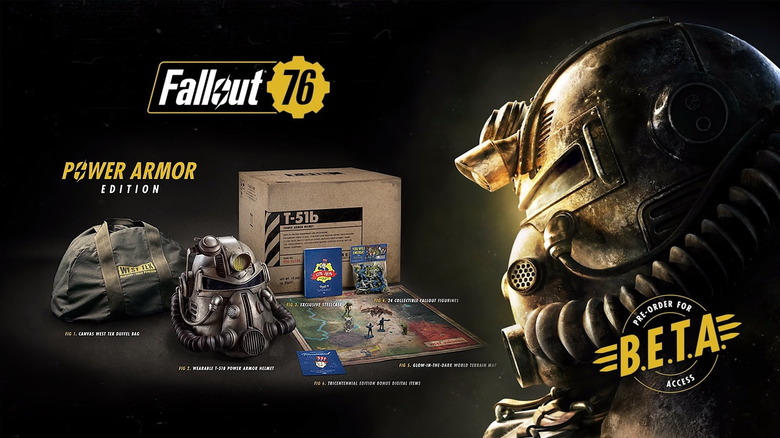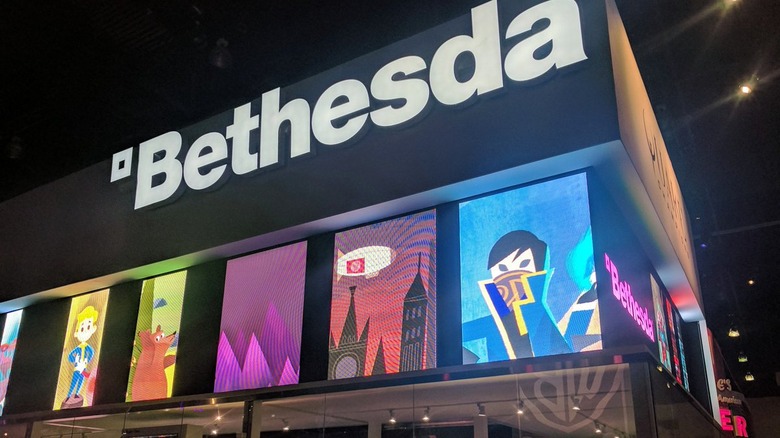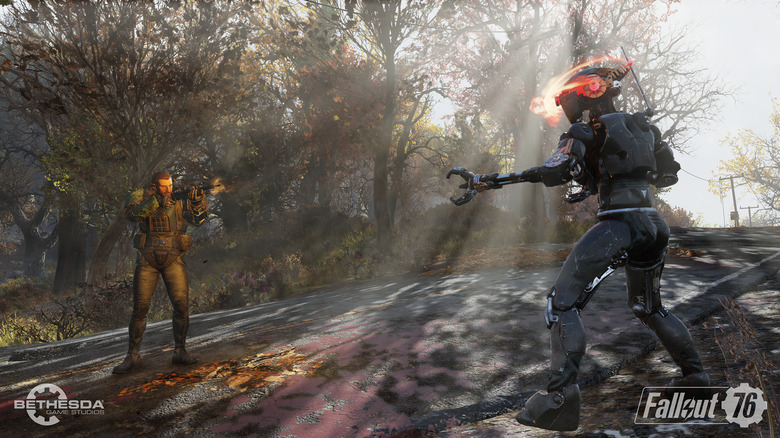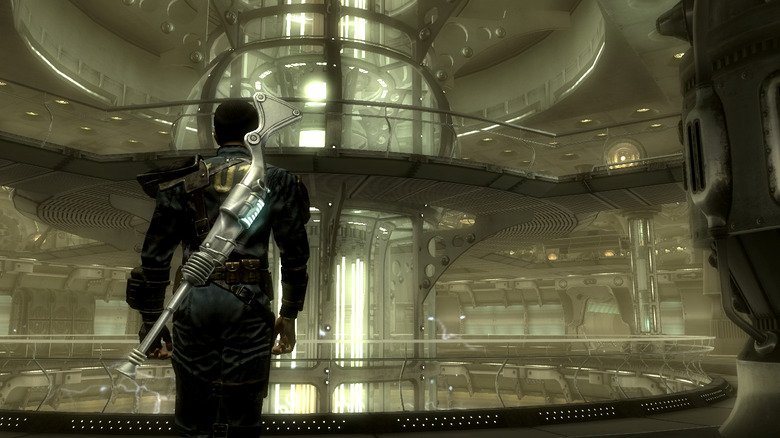The Shady Side Of Bethesda
It's tough to say that Fortnite isn't the most talked-about game in the world right now. But what about the most talked-about game company? For the right reasons, you could still probably point to Epic Games and the stellar year that Fortnite's had in 2018. But for the wrong reasons? The 2018 award might have to go to Bethesda.
It wasn't always this way for for the studio. Remember Oblivion? Remember Fallout 3? Remember Skyrim? Bethesda was a darling in the video game world. Fans loved their games. They packed Bethesda's show at E3, hoping to catch a glimpse of the studio's next big thing. And then Fallout 76 happened.
We'll get into all the trouble Fallout 76 has been causing the company as of late. But it's important to note that Bethesda didn't just start being a shady company in the year 2018. In fact, they have a history of seedy business decisions dating all the way back to the days of the Xbox 360 and PlayStation 3. This is the shady side of Bethesda.
Their Creation Club didn't please many fans
Mods have been an important part of Bethesda's games for years, and most fans of the company's games have grown used to downloading and playing with them. In fact, some even see mods as integral to experiencing a Bethesda title. That's why many were not happy to see Creation Club take up residence inside Fallout 4.
For those not in the know, Creation Club is a microtransaction platform that Bethesda introduced first in Fallout 4 and later in The Elder Scrolls V: Skyrim. It's basically a way for mod developers to charge for their goods, and for Bethesda to get a cut of that sweet, sweet mod money. Unpaid mods do still exist, but many in the Bethesda community see Creation Club as a slippery slope that could one day lead Bethesda to do away with free mods entirely.
Back in the good old days, one might have given Bethesda the benefit of the doubt when it comes to being overtly anti-consumer. But the company has been losing more hearts and minds than it's been winning lately, and in that context, Creation Club suddenly looks a lot more like an ominous harbinger than it used to.
They sued the makers of Minecraft for using the word 'Scrolls'
Can you own a single word out of a multi-word brand name? The very idea seems ridiculous on its face. For instance, if someone wrote a book called Turtle Thrones, you wouldn't expect George R.R. Martin and TMNT owners Nickelodeon to team up for a mega lawsuit. Nevertheless, Bethesda put that very idea into practice, suing another game company for having the gall to use the word "Scrolls" in the name of one of its planned titles.
Plot twist: the company Bethesda sued was none other than Mojang, the developer of Minecraft.
The suit was eventually settled, with Mojang gaining the right to name its game Scrolls. But the company later flipped the script. In mid-2018, Scrolls was released to the public for free, but under a completely different name. As developer Måns Olson announced, "We've got a new name — 'Caller's Bane'. I'm sure there's a good reason for it. Perhaps we just didn't like the sound of 'Scrolls'."
They once had a terrible review policy
In the world of games journalism, it's typically common practice for an outlet to receive a game days or even weeks ahead of its retail release. This gives a magazine or website time to thoroughly play through it, review it, and create walkthroughs and other content. You can usually get a sense for how much a publisher believes in its game by how early the review copies come. The closer outlets get a review copy to the actual release date, the more they might be trying to hide, and the worse the game probably is.
Believe it or not, Bethesda once stopped sending out early game copies altogether. And it really didn't make any sense.
Bethesda — at least a few years ago — wasn't a company known for releasing bad games. In fact, most of them were very good. So when the studio started holding review copies until release date, the industry was quite confused. Bethesda stated that they wanted everyone, gamers and journalists alike, to play the game at the same time. But what the policy did instead was encourage outlets to rush their playthroughs and their content, which wound up hurting coverage of Bethesda's games.
Bethesda eventually relented on the policy, citing the fact that most reviews brought it up before talking about the games themselves.
They made ridiculous microtransactions a thing
Microtransactions in games are pretty much a way of life these days. You'll find some titles that use them sparingly, and some that rely on them to a shocking degree. Just know this: there's a very good chance that, at least in the world of mainstream games, you have Bethesda to thank for the more ridiculous forms of microtransactions.
Case in point: horse armor, an add-on in The Elder Scrolls IV: Oblivion that became a meme-ready way to describe microtransactions that are inconsequential and overpriced.
Bethesda caught a lot of flack for introducing horse armor to Oblivion in 2006, but little did the company know that, years later, we'd still be talking about it. Cracked put horse armor on its list of "the most insulting things video games charged money for." And we included horse armor in our own catalog of ridiculous DLC, citing the fact that Oblivion was an offline game, so you couldn't even show off the horse duds you paid for.
There are tons of examples of horse-armor-esque DLC bits these days. But Bethesda really got the whole wagon rolling on that front, and there's no sign that the trend is going to slow down.
They milked the heck out of Skyrim
The Elder Scrolls V: Skyrim was a true gem when it released in 2011. Sure, it had all the bugs you'd expect in an open-world Bethesda title, but it truly nailed down what it took to make a great Elder Scrolls game: tons of customization, endless questing, and just enough modern-day amenities (such as fast travel) to make the game friendly to all kinds of players. When the reviews came in, it was decided. Skyrim was already a classic.
The problem was, Bethesda also knew how good Skyrim was. If only we'd been able to see into the future at how much more Skyrim we'd be getting, maybe we would've toned it down a little.
Skyrim has been released and re-released on more platforms than you can count on one hand. There's the original version on PC, and the ports of that to the Xbox 360 and PS3. Then you have to count the remasters that hit PC, Xbox One, and PlayStation 4. There's also Skyrim VR for PC and PlayStation VR. Oh, and the Nintendo Switch release. And did we mention that there's a version of Skyrim for Alexa, too? Yes, seriously. "Hey Alexa, play Skyrim" is a thing you can say.
Bethesda has been milking Skyrim for years now, and we have to wonder how much of that effort could be better spent elsewhere. Enough is enough.
They sued Interplay over use of the Fallout IP
For all of the fanfare Bethesda's gotten with the releases of games like Fallout 3 and Skyrim, it's easy to forget that the company can sometimes be a bit litigious. Bethesda has long operated by advertising a sort of "gamers first" mentality, but when it comes to their fellow developers and creators, they aren't always so kind.
There's no better example of that than Bethesda's suit against Interplay, the company that originally made Fallout.
The suit ultimately came down to whether or not Interplay could make an MMO based on the Fallout universe. When Interplay sold the Fallout rights to Bethesda in 2007, Interplay was under the impression that they could license back the brand they created for use in their own MMO. Bethesda claimed that Interplay hadn't met the terms of the agreement, and took Interplay to court to battle it out. The two companies eventually settled, with Bethesda paying Interplay a $2 million settlement in order to keep Fallout all to themselves. And now, as you probably know, Bethesda developed their own spin on a Fallout MMO. And things are going great!
Just kidding. They aren't.
They refused to issue refunds for Fallout 76
Some had a bad feeling about Fallout 76 the evening that Bethesda announced it on stage during E3 2018. A multiplayer version of Fallout? That doesn't sound like the Fallout we've grown accustomed to. Still, some held fast to hope that Fallout 76 could deliver. But perhaps the writing was on the wall when Bethesda announced the PC version of the game would be sold through their own Bethesda launcher.
That put Bethesda in charge of refunds. And when people ultimately realized that Fallout 76 wasn't very good, they asked for those refunds. And Bethesda wasn't having it.
The situation surrounding the studio and its Fallout 76 customers has devolved to the point where a class-action lawsuit is in the works, pointing to "unfair and deceptive trade practices." Fallout 76 has been a rare near-total black eye for Bethesda, a studio usually known for pretty good titles. And unfortunately, as you'll discover below, refundgate isn't the only way that they've stepped in it with regard to Fallout 76.
They ripped off buyers of Fallout 76's Power Armor Edition
As if the poor reception to Fallout 76 wasn't enough by itself, Bethesda had another controversy on their hands soon after. Fallout 76's Power Armor Edition looked to have a lot of appealing goodies, including a replica helmet and a sturdy canvas bag. But when fans started to receive the Power Armor Edition of the game and all of its included items, they noticed something was different.
The canvas bag promised as part of the package was no longer canvas. Instead, it was made of nylon, a far less durable material. Many who purchased the Power Armor Edition were understandably livid.
In support messages to angry customers, Bethesda explained that they had to change to a nylon bag due to "unavailability of materials." What Bethesda didn't tell those customers, though, was that they had actually given some nice canvas bags out to influencers at a promo event. For free. People who didn't pay for the expensive game package got fine canvas. Those who did got nylon bags.
Eventually, the terrible press became too hard to ignore. Bethesda tweeted out that they would replace the nylon bags in the Power Armor Edition with canvas bags, and that would hopefully be the end of it.
It wasn't.
Their support website doxxed a whole bunch of customers
When all of those rightfully miffed customers got in touch with Bethesda about their bag replacements, the company managed to create an entirely new problem out of that, too. Somehow, it was way too difficult for Bethesda to just collect some contact information and send some canvas bags out to make people happy. As it turns out, they couldn't manage that task without exposing a huge backdoor in their support system, which (for reasons that baffle us) gave those submitting tickets unfettered access to the support platform.
This meant that anyone who submitted could suddenly see the names and addresses of many Fallout 76 customers. Bethesda effectively doxxed a large swath of the player base that they had already ticked off to begin with.
Fortunately, the company wasn't as slow to respond this time around. They didn't make excuses or try to offer a pittance of in-game currency in return for the error. Instead, they quickly got to work and had the issue resolved in short order. Still, talk about going from bad to worse.
Their stealth changes to Fallout 76 made the game even worse
Believe it or not, there are actually some people in the world who enjoy playing Fallout 76. They've been able to look past the game's botched launch, all of the bad reviews, Bethesda's refusal to issue refunds, their awful handling of the bag situation, and the support website vulnerabilities, and still manage to find fun in the game. But because they were apparently destined to disappoint every last one of their customers, the studio had to go and do something wrong yet again.
This time, it had to do with a patch introduced to Fallout 76 to fix some bugs and straighten out the game's economy. Bethesda snuck some additional changes into the game without including them in the patch notes, and when players noticed, they were not pleased.
As it happens, some of the changes reduced ammo production in the game, nerfed fusion core production, and turned down the spawn rate of legendary creatures. Failing to disclose such alterations would be bad under any circumstances. What made it worse, though, was that Bethesda had vowed in a Reddit post to be more transparent with the game's community. Yikes.
They also sued a fan for creating free Fallout art
What is it with Bethesda and Fallout? It seems like, despite all the great Fallout content they've managed to create over the past decade or so, the studio draws as much poison from the franchise as they do money. And way back in December 2011, the company managed to execute one of the biggest jerk moves ever against a huge Fallout fan who simply loved the series.
His name was Erling Andersen, and he just wanted to create and share some Fallout art.
Normally when you see fansites get taken down, the reasons are pretty understandable. Sometimes the owners are trying to profit off of the property they're paying homage to. Sometimes they aren't profiting directly from the work itself, but there's advertising on the site, and property holders feel they have to act in order to protect their IPs.
Erling Andersen did no such thing. He enjoyed the art style of Fallout and decided to draw some custom posters, which he then posted online and shared with the larger Fallout community for free. He didn't try to sell the posters. He didn't have ads on his site. He just shared his works and hoped others got a bit of joy from them.
Then came the cease-and-desist letter from Bethesda's lawyers. They basically accused Andersen of copyright infringement, stating that Fallout art might "cause consumer confusion." Rather than fight it — which would've been tough, as Andersen was located in Norway — he simply took the website down.


